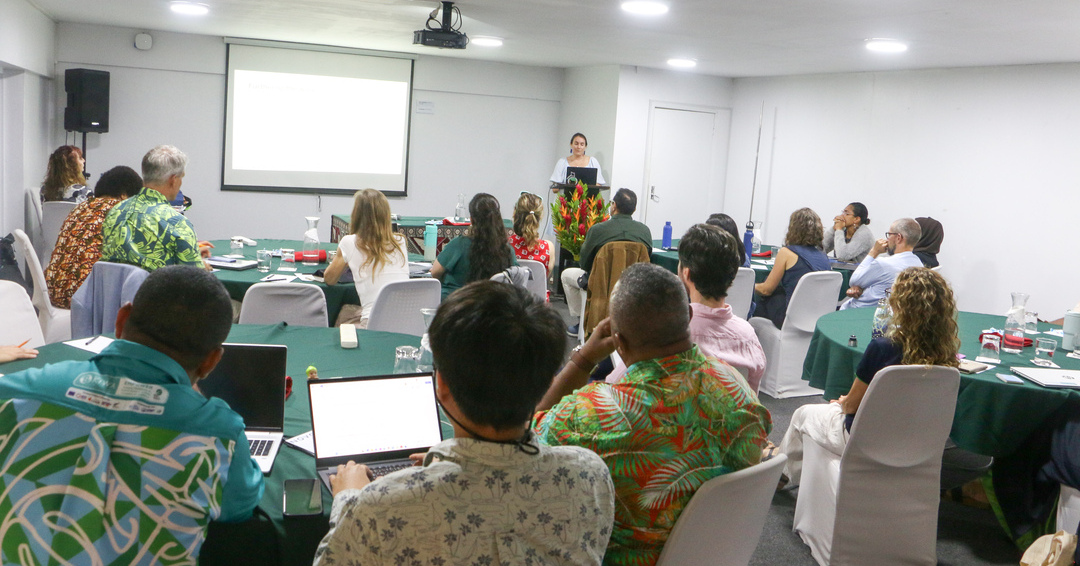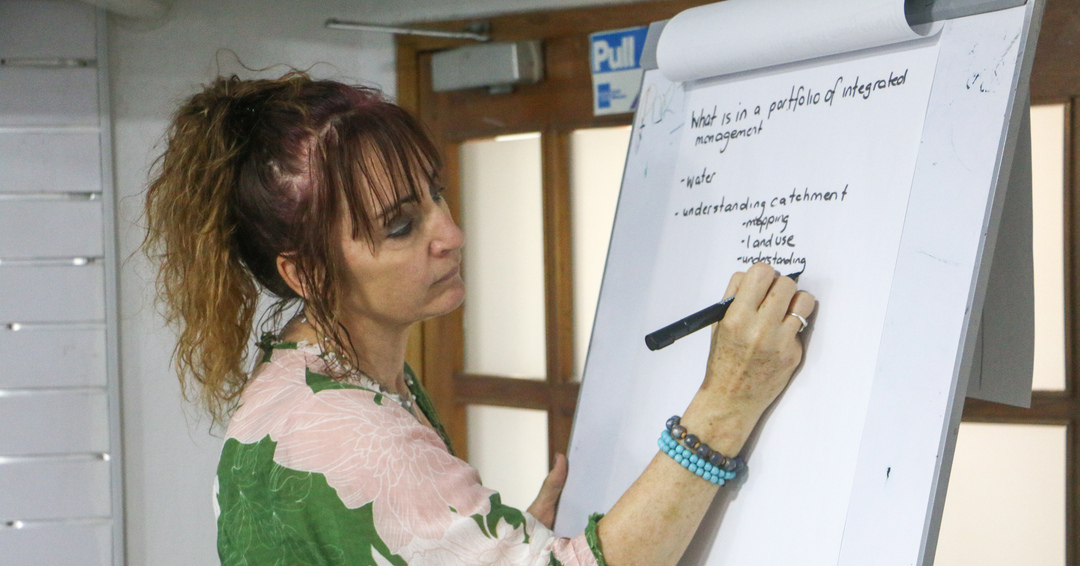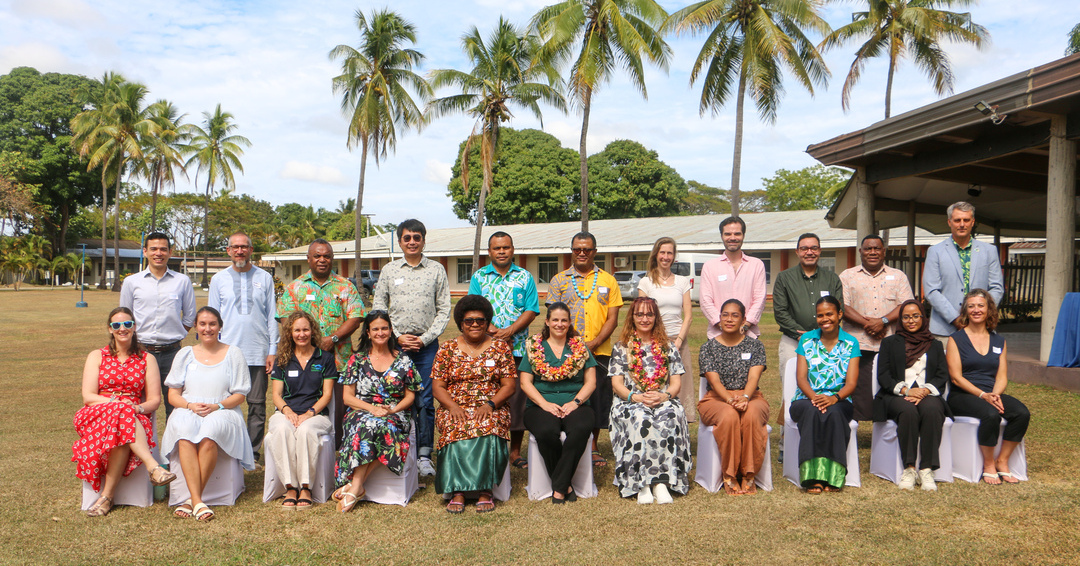Coral conservation experts gathered at a CORDAP workshop in Fiji to discuss the actions needed to address land-based pollution and water quality issues in a way that contributes to efficient coral restoration.
Pollution from land-based activities is now the top local anthropogenic threat for over 30% of coral reefs worldwide. Without addressing sediment, nutrient, and contaminant pollution, efforts to protect and restore coral reefs and other coastal habitats will be in jeopardy. There is a significant gap in accessible, practical guidance for mitigating land-based pollution—especially compared to the availability of manuals for coral restoration and Marine Protected Area (MPA) implementation.
Identifying the gaps and needs on how land-based pollution and water quality affect coral restoration, and paving the way to advance the solutions needed to conserve and restore corals and reefs is urgently needed. That’s why, as part of an ongoing series of scoping studies, CORDAP co-hosted a five-day workshop in Fiji, between October 6th to 10th, 2025, together with CEFAS, the Nutrient Pollution Global Action Network and Wildlife Conservation Society. This collaborative workshop on ‘Water Quality Solutions for Coastal Habitats’ brought together 27 experts from 13 countries to develop an easy-to-use, comprehensive guidance document for coastal managers and policymakers on interventions to reduce sediment, nutrient, and contaminant pollution reaching coral reefs and other coastal habitats.

CORDAP water pollution workshop, Fiji, 2025. Photo: Jona Uluinaceva © WCS
How does water quality and land-based pollution affect coral restoration?
Nearly one billion people live within 100 kilometres of coral reefs, creating immense pressure through sediment, nutrient, and contaminant runoff from agriculture, deforestation, and urbanisation. These pollutants degrade coral health, reduce biodiversity, and undermine reef resilience. Without addressing declining water quality, restoration and protection efforts risk failure. Unlike coral restoration or MPA management, there is no consolidated manual for tackling water quality challenges.
Water quality is undeniably a major concern for the health of reef ecosystems globally. The ‘Water Quality Solutions for Coastal Habitats’ workshop sought to tackle this problem by fostering discussions between interdisciplinary experts (researchers and practitioners working in coral restoration, agriculture, land-based pollution, among others) from various regions.
Unsurprisingly, reducing the negative impacts of coastal pollution and water quality degradation cannot be achieved without the involvement and commitment of multiple actors and stakeholders. Throughout the week, participants collaborated towards the maim aims of the workshop:
- Develop an easy-to-use, comprehensive guidance document for coastal managers and policymakers on interventions to reduce pollution reaching coral reefs and other coastal habitats.
- Produce actionable roadmaps to guide future activities and identify where R&D investment is most needed in order to implement key water quality solutions to help save the world’s corals.
- Identify priorities and actions to achieve water quality solutions at national and regional level.
- Publish a peer-reviewed manuscript summarising the main outcomes and findings of the workshop.

CORDAP water pollution workshop, Fiji, 2025. Photo: Jona Uluinaceva © WCS
Highlights of the workshop
The fruitful discussions throughout the workshop resulted in several key insights and recommendations. Among the most pressing suggestions were:
- Improve access to and sharing of knowledge on water quality management, particularly among stakeholders in low- and middle-income countries (LMICs).
- Increase access to affordable technologies that support effective water quality monitoring and management in LMICs.
- Address pollution across the entire cycle — from source reduction in agriculture and sanitation to effective wastewater treatment — rather than focusing only on pollutants that have already reached waterways and the ocean.
- Implement, scale, and exchange knowledge on nature-based solutions as part of integrated strategies to improve water quality and strengthen coral reef resilience.
Participants also helped identify and prioritise research and development needs to fill evidence gaps and advance innovative solutions, supporting long-term improvements in coral reef health and resilience.

CORDAP water pollution workshop, Fiji, 2025. Photo: Jona Uluinaceva © WCS
Next steps
Looking ahead, the next few months will be dedicated to drafting a technology roadmap that encapsulates the findings and recommendations from the workshop, a guidance document with tool-kit for easy implementation and at least two peer-reviewed publications.
Inclusion and diversity
We recognize that solving global coral challenges requires diverse perspectives and have continued to prioritize inclusivity and diversity in our workshops. This time, we gathered attendees from 13 different countries, spanning key coral reef regions (e.g., Caribbean, Red Sea, Coral Triangle, East Asia, and the Pacific Islands). In this workshop, 50 % of participants were female and approximately 50 % came from low- or middle-income countries.
By prioritizing gender balance and inclusion from underrepresented regions, CORDAP reinforces its commitment to creating a more equitable and effective global response to coral conservation.
